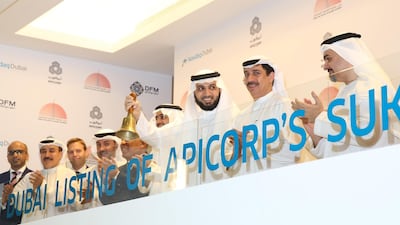The global sukuk market is expected to grow 12 per cent this year, aided by a sharp gain in issuance from GCC sovereigns as well as increasing demand from Islamic retail banks, according to Moody's Investors Service. The momentum in sukuk sales, which are rebounding from a lull in 2015, is expected to continue into next year as GCC governments borrow money to help plug budget deficits.
Sales of Islamic bonds are forecast to rise to US$95 billion in 2017 from $85bn in 2016, Moody's said. Last year's sales included more than $50bn of issuance from sovereigns.
"Sovereigns have underpinned a recovery in the global sukuk market this year, with their issuance increasing by 50 per cent in the first eight months of 2017," said Christian de Guzman, senior credit officer at Moody's.
"We expect sovereign sukuk issuance volumes will continue to grow in 2018 as governments look to diversify their financing mix and satisfy the liquidity needs of Islamic retail banks."
_____
Read More:
Emirates REIT may issue sukuk certificates
_____
GCC sovereigns are expected to borrow a total of $148bn next year, Moody's said. This year, Arabian Gulf nations drove the sukuk market as Saudi Arabia led the way with $17bn of sukuk sales, representing 40 per cent of global long-term sovereign sukuk issued in the first eight months of the year.
The rating agency said that other regional nations with large fiscal deficits, including Oman and Bahrain, were also likely to tap the sukuk market. Oman has an estimated budget deficit of 11.9 per cent of gross domestic product while Bahrain has a budget deficit of about 13.4 per cent of GDP.
S&P Global Ratings said in June it expects sukuk sales this year to range between $75bn and $80bn, higher than its previous estimate of $60bn to $65bn, as more governments tap the fixed income market for their funding needs. This year’s sales will be exceptional and are unlikely to be repeated next year, the agency said.
Governments, which last year primarily tapped conventional debt markets, are seeking to diversify their investors’ base this year with sukuk sales.
The rating agency forecast that Arabian Gulf governments’ financing needs will reach $275bn between this year and 2019. About 50 per cent of that figure will be met from fixed income markets issuances, with a preference for conventional bonds over sukuk, it added.

